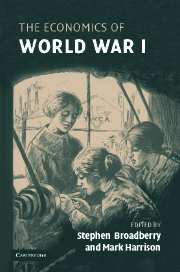Book contents
- Frontmatter
- Contents
- List of figures
- List of tables
- List of contributors
- Acknowledgements
- Introduction
- 1 The economics of World War I: an overview
- 2 The pity of peace: Germany's economy at war, 1914–1918 and beyond
- 3 Austria-Hungary's economy in World War I
- 4 The Ottoman economy in World War I
- 5 Between the devil and the deep blue sea: the Dutch economy during World War I
- 6 Was the Great War a watershed? The economics of World War I in France
- 7 The United Kingdom during World War I: business as usual?
- 8 Poor Russia, poor show: mobilising a backward economy for war, 1914–1917
- 9 Italy at war, 1915–1918
- 10 Until it's over, over there: the US economy in World War I
- Index
- References
Introduction
Published online by Cambridge University Press: 23 July 2009
- Frontmatter
- Contents
- List of figures
- List of tables
- List of contributors
- Acknowledgements
- Introduction
- 1 The economics of World War I: an overview
- 2 The pity of peace: Germany's economy at war, 1914–1918 and beyond
- 3 Austria-Hungary's economy in World War I
- 4 The Ottoman economy in World War I
- 5 Between the devil and the deep blue sea: the Dutch economy during World War I
- 6 Was the Great War a watershed? The economics of World War I in France
- 7 The United Kingdom during World War I: business as usual?
- 8 Poor Russia, poor show: mobilising a backward economy for war, 1914–1917
- 9 Italy at war, 1915–1918
- 10 Until it's over, over there: the US economy in World War I
- Index
- References
Summary
During the twentieth century the world experienced two deadly global wars followed by a ‘cold war’ of unparalleled expense and danger. World War I opened this brutal epoch. To many who took part the experience was little less than apocalyptic; it seemed like an end, not a beginning. They saw it as putting a stop to history, progress, and civilisation. They called it the ‘Great War’. They did not know that it would be followed twenty years later by World War II and that the second war would be greater and more dreadful than the first.
This book brings together nine country studies of the economics of World War I: five Allies, three Central Powers, and a neutral country. Our book is the first, we believe, to offer such a systematic comparison of economies at war between 1914 and 1918, and it is certainly the first to include the Ottoman Empire in such a collection. These investigations suggest two themes that link economics with the study of war.
One theme is the contribution of economic factors to the outcome of the war. Our book suggests that the outcome of global war was primarily a matter of the levels of economic development of each side and the scale of resources that they wielded; in this respect our conclusion is similar to that of our previous study of World War II (Harrison, 1998).
- Type
- Chapter
- Information
- The Economics of World War I , pp. 1 - 2Publisher: Cambridge University PressPrint publication year: 2005
References
- 1
- Cited by



